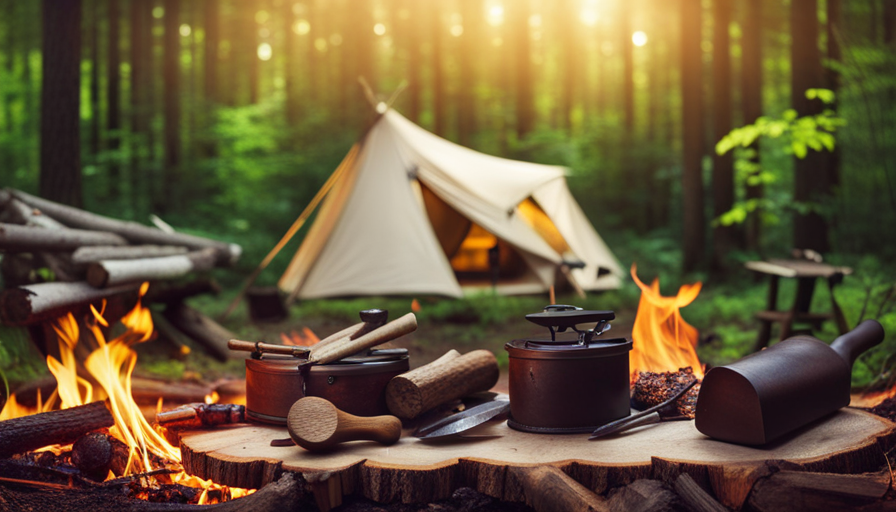Bushcraft camping is not for the faint of heart. It requires a set of skills and tools that are specific to surviving in the wild. The experience can be both exciting and challenging, but only when you know how to master it.
In this article, we will explore the 13 essential skills and tools necessary to become a proficient bushcraft camper. From water sourcing and fire making, to shelter building and knot tying, mastering these skills will help you survive in the bush.
Knowing how to navigate through the wilderness, hunt for food, and purify water are just some of the many skills that you’ll need to perfect. In addition to these skills, having the right tools will make your camping experience much more enjoyable. With the right equipment, you’ll be able to explore the great outdoors with confidence and ease.
So, if you’re ready to take your camping skills to the next level, read on and discover the secrets of bushcraft camping.
Skills for Survival
When it comes to mastering bushcraft camping, it’s crucial to focus on the essential skills for survival. These include water sourcing, fire making, food acquisition, shelter building, navigation, first aid, and knot tying. Without these skills, surviving in the wild can be incredibly challenging, if not impossible.
Water sourcing and purification are the most critical skills to have in bushcraft camping, as the average person can only survive for three days without water.
Fire making is also essential, as it is necessary for staying warm, cooking food, purifying water, and warding off predators.
Food can be acquired through hunting, trapping, fishing, or foraging, and shelter building is key to bushcraft camping, utilizing the resources available to survive.
Navigation is a valuable skill, especially if you do not want to carry a compass.
Basic first aid knowledge could save your life in the event of an injury.
Finally, knot-tying skills are crucial for successful trips since they will help you bind shelters and secure equipment.
Valuable Tools
The six most important items for successful bushcraft in a remote location include a knife, saw or ax, firestarter, rope or paracord, pot, and compass. These tools are essential for survival in the wild, and each serves a specific purpose.
A knife is the ultimate survival tool, as it can be used to create other tools, hunt, and prepare food. An ax or saw is important for shelter building, walking through thick woods, and cutting firewood. A firestarter can be flint and steel, lighters, or matches, saving tons of time and effort.
Rope or paracord can be used for fishing, binding shelters, raft building, sewing, and much more. A pot is less essential, but can still be a game changer for carrying water and cooking food. A compass is nice to have, especially if you don’t want to bother learning navigational skills.
Each of these tools serves a crucial purpose in bushcraft camping, and it is important to bring all of them to ensure a successful trip. While some may argue that certain items are more important than others, each tool has its own unique value and can be used in a variety of situations.
In addition, it is important to ensure that each tool is of high quality and in good condition, as a broken or faulty tool can greatly impact your ability to survive in the wild.
With these six essential tools, you will be well-equipped to tackle the challenges of bushcraft camping and enjoy a successful and rewarding experience in the great outdoors.
Improving Your Abilities
Improving your abilities in bushcraft requires practice and experimentation with different techniques and tools. While there are basic skills and tools that are essential for bushcraft camping, there are also many ways to approach and refine these techniques. Here are some ways to improve your bushcraft abilities:
- Practice building different types of shelters using different materials. This will help you become more adept at using the resources available to you in a given environment.
- Experiment with different fire-starting methods, such as using a bow drill or a hand drill. This will help you become more proficient in starting fires under a variety of conditions.
- Try different methods of water sourcing and purification, such as using a solar still or a water filter. This will help you become more self-sufficient in obtaining clean drinking water.
- Learn how to forage for wild edibles and practice identifying different plants and fungi. This will help you become more confident in your ability to find food in the wild.
By practicing and experimenting with different techniques and tools, you can improve your bushcraft abilities and become more self-reliant in the wild. It is important to challenge yourself while also being mindful of safety and environmental impact.
Remember that bushcraft is a skill that can always be honed and improved upon, and that there are many different ways to approach this craft.
In addition to practicing and experimenting, it can be helpful to seek out resources for learning and inspiration. Books, online forums, and workshops can all provide valuable information and insights into the world of bushcraft. By immersing yourself in this community and learning from others, you can continue to grow your skills and knowledge in bushcraft camping.

